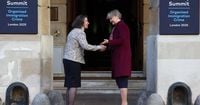On March 31, 2025, Prime Minister Dick Schoof and Minister of the Interior Judith Uitermark are set to sign off on Royal distinctions for five volunteers in the refugee sector, following a controversial refusal by Minister of Asylum and Migration Marjolein Faber (PVV) to approve the awards. Faber's decision has sparked widespread criticism from coalition partners, opposition parties, and government officials alike.
Faber's refusal to sign the nominations, which she justified by claiming that the volunteers' work contradicts her strict asylum policy, has been met with outrage. "Their work is at odds with my policy," she stated in an interview with NOS. "I stand for a strict asylum policy because I want to drastically reduce the influx and also the number of residency permits." Her stance is particularly surprising given that the Minister's signature is usually a mere formality in the awards process.
The five honorees are former volunteers with the Central Agency for the Reception of Asylum Seekers (COA), which operates under Faber's own ministry. COA expressed shock at the refusal, stating, "We think it is self-evident that people who make a huge effort to help other people should be recognized for this." The Rijksvoorlichtingsdienst (RVD), the government’s information service, confirmed that Schoof and Uitermark will sign the honors in their capacity as responsible officials for the national awards system. A spokesperson for the Prime Minister indicated that the request for their signatures will be submitted "fairly quickly" by the Chapter for Civil Orders.
Despite this resolution, Faber's decision has raised serious concerns about the impartiality of the honors system and the potential for political ideology to interfere in its administration. Faber has not commented on Schoof and Uitermark’s decision, leaving many to speculate about the implications of her refusal.
PVV leader Geert Wilders showed unwavering support for Faber, tweeting, "What a courage, what a strength, what a great Minister." However, this support has not shielded Faber from criticism. Pieter Omtzigt, leader of the NSC, described her decision as "bizarre," questioning why she would refuse to honor volunteers working for her own ministry's agency. Caroline van der Plas of the BBB labeled it "very, very sad," while Dilan Yeşilgöz, leader of the VVD, called for more respect for volunteers, urging, "Let us please treat each other maturely in this country and thank volunteers for their efforts."
Opposition leaders have been particularly vocal in their condemnation of Faber's actions. Henri Bontenbal of the CDA criticized her for politicizing the awards, stating, "Royal medals belong to society and are requested by people from society. Does everything have to be made political? Minister Faber is overstepping the boundaries of decency here." D66 parliamentarian Anne-Marijke Podt accused Faber of undermining her own agency, calling the situation "too pathetic for words." ChristenUnie MP Pieter Grinwis characterized Faber's actions as "bizarre, indecent, and heartless," adding, "The only positive thing about this policy is that apparently, Faber reads her documents and does not sign them blindly."
The King’s Commissioners, who oversee the integrity of Royal distinctions, have also expressed deep concern over Faber’s refusal. René Paas, the King’s Commissioner in Groningen, issued a statement on LinkedIn, warning that Faber’s decision threatens the objectivity of the awards system. "Royal distinctions are not a political instrument," he stated, emphasizing the need to keep the awarding of Royal distinctions free from political considerations.
As the Chapter for Civil Orders prepares to submit the request for Schoof and Uitermark’s signatures, the controversy surrounding Faber's actions lingers. While the move ensures that the five volunteers will receive their awards, it raises broader questions about the impartiality of the honors process and the potential for political interference in future decisions.
Faber's refusal to sign off on the awards has not only ignited a firestorm of criticism but also highlighted the divisions within the coalition government. Many are calling for accountability, with Bontenbal urging that Faber should be held responsible for her actions during the upcoming question hour in Parliament. The political fallout from this incident is far from over, as leaders across the spectrum continue to weigh in on the issue.
As the dust settles on this controversy, the implications for the volunteers, the honors system, and the political landscape remain to be seen. The incident serves as a reminder of the delicate balance between policy and recognition in a politically charged environment.








